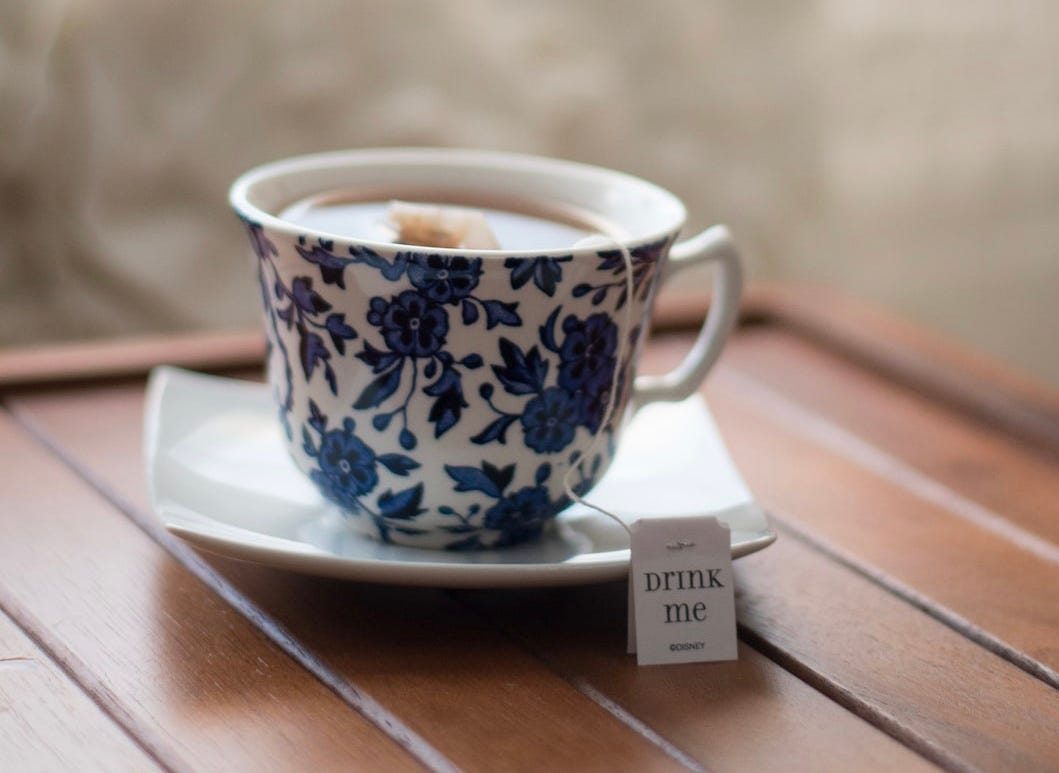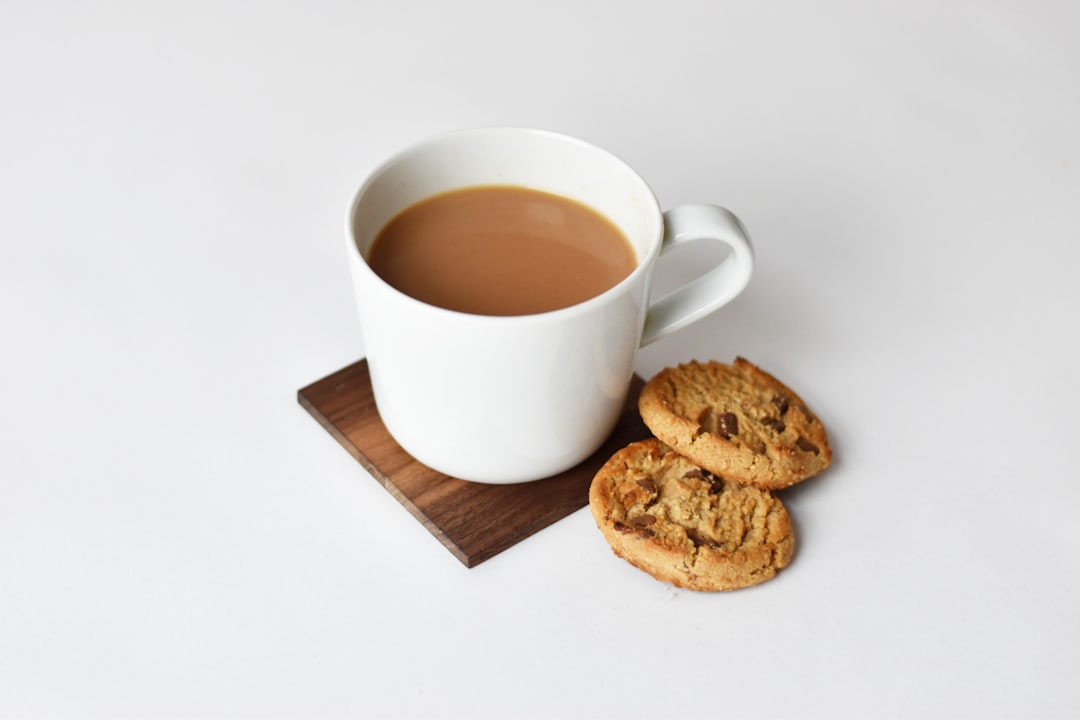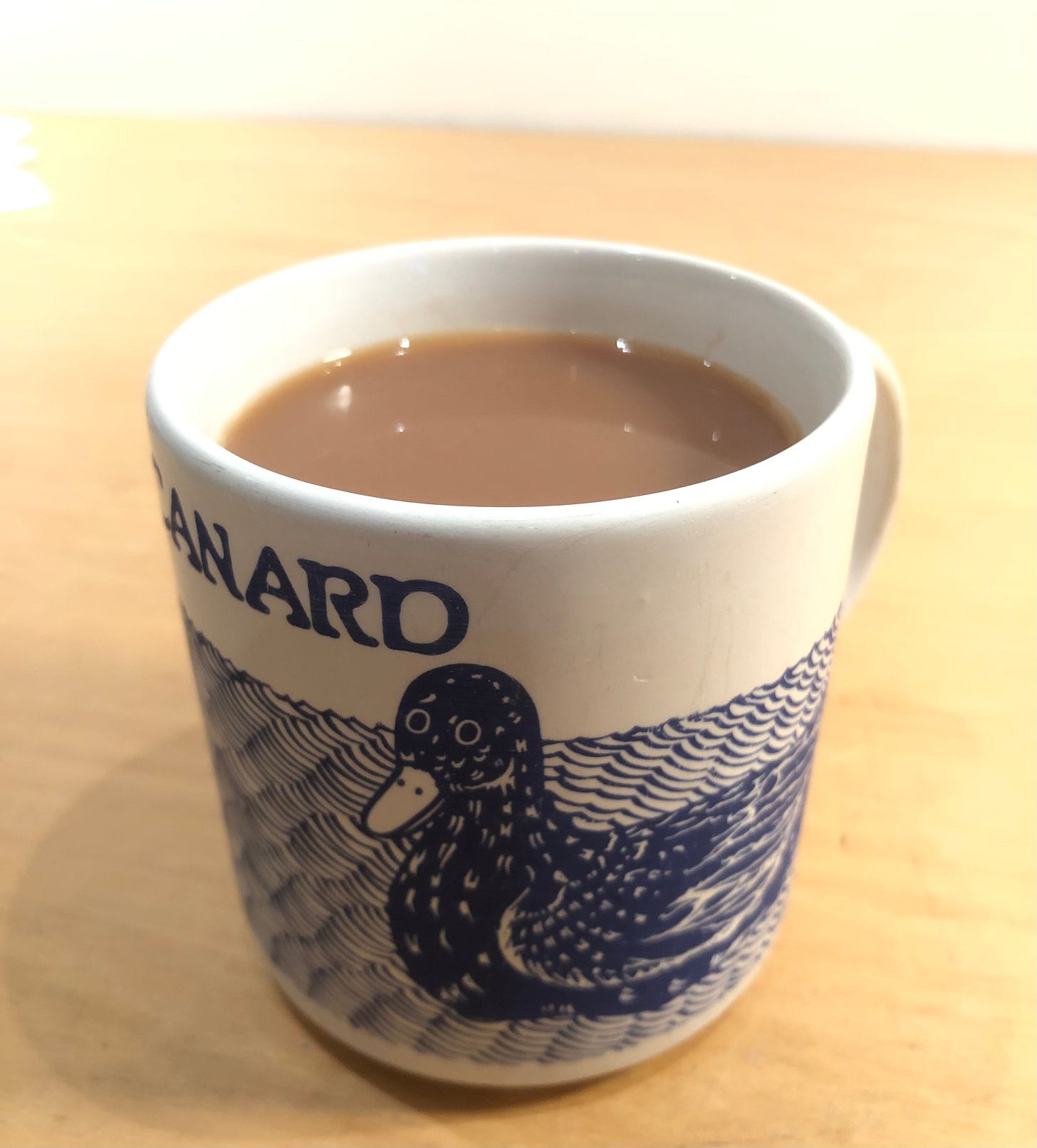32. Expec-tea-tion
Noun: /ɛkspɛkˈti:ʃ(ə)n/ - the feeling you get when you know you’ve left a half-drunk cuppa somewhere.
Dear Reader,
I have drunk tea for as long as I can remember. An early picture of me as a very young child sees me sitting on the loo with my feet dangling, a cup of tea in hand, and laughing my little head off.

My brother and I used to share a bedroom next door to our parents’ room, and getting up time every morning would be signalled by the gurgling of the Teasmade through our shared wall.
We’d open their bedroom door as quietly as a three- and a four-year-old could manage, and we’d take it in turns each day to ask these two questions:
‘Can I do the sugar and the milk?’
‘Please may we play with our toys?’
Same script every morning. Of course we’d both want to be doing the sugar and the milk, but we knew we had to take it in turns.
It was the late 1970s, and the Teasmade1 was quite the mod con. I suspect ours had perhaps been a wedding present on our parents' marriage at the start of the decade.
The tea would already be waiting in its funny, square little pot, and one of us – whoever’s turn it was – would put two big spoonfuls of sugar and a large slug of milk into each of the mugs. Dad would pour the tea, and an extended spell of messy stirring would follow before we would leave our parents in peace to enjoy their brew. Back in our room, we’d then get on with the other half of the script: playing with our toys.
Only after that first cuppa had been accomplished would we properly start our day. Because tea is what fuels us British.
🇬🇧
Tea at work
A chart on the office kitchen clipboard in my London days showed staff members everything they needed to know to make and deliver a round of tea: a column of names on the left, and corresponding codes on the right. WT0 = white tea, no sugar; WT2 = white tea, two sugars, and so on. One new colleague, desperate on his very first tea round not to deliver a WT1 to someone whose preferred tipple was actually a WT0, nipped back to his desk for a Sharpie pen to label the mugs while the kettle was boiling, and then got so wound up about the potential risk of getting things wrong that he was on the verge of a panic attack.
He went back to his desk looking flushed, and after I found his Sharpie abandoned in the kitchen I duly made my own delivery to him – a mug brimming with ice, with ‘CHILL!’ written on it. I even gave him the pen back.
I winked at him. ‘Need to cool down, Tony?’ He laughed.
Tony settled into his job and within a few short weeks had become the office joker. I was chatting to him one morning about that strange feeling I get when I know I haven’t finished a cup of tea and I’m looking forward to getting back to it, and he regarded me thoughtfully, a twinkle in his eye.
‘Ah!’ he said. ‘Expec-tea-tion!’ I was stunned. He understood!
‘Exactly! That’s exactly it!’
That afternoon when it was my turn again I made a round of tea and delivered everyone’s cuppa to their respective desks. After I’d drunk half of mine I headed into the back room to file a few things, leaving my mug on my desk to come back to.
Soon I returned to my desk. No tea. ‘Where’s my tea?’ I asked my nearest colleague. She shrugged. ‘No idea!’
I walked down to Tony’s end of the office, and stood at his desk. ‘What?’ He seemed grumpy. ‘I’ve got a lot on.’
I sucked my lip. ‘Nothing.’ Maybe someone had cleared up the mugs from everyone’s desks? They didn’t usually. And mine hadn’t even been empty!
‘She’s lost her cup of tea, Tony’, my colleague explained.
‘Have you actually just forgotten that you’ve drunk it?’ Tony asked.
‘No, my mouth KNOWS that I haven’t finished it! Expec-tea-tion, remember?’
With a ‘say what?’ expression on his face, Tony raised his eyebrows and did that universal ‘she’s crazy’ gesture. You know the one I mean. He shook his head and looked back to his screen.
Embarrassed, confused, and by now seriously questioning my sanity, I headed for the back room again to calm down over the rest of my filing. Had I imagined that conversation earlier?
‘Rebecca! There’s a delivery for you!’
I sighed, and walked slowly back to my desk. There was my half-full mug of tea again, with ‘HA HA!’ written across it. I picked it up and looked at the other side.
‘Love, Tony’.
He’d left his Sharpie on my desk. This time I kept it.
🖊
The European take on ‘British’ tea
Ordinary, bog-standard tea bags round these parts don’t have those fancy strings and tags – I think until I moved to Germany in 1990 the only tea bags that I’d come across that did were herbal or fruit teas. Reader, there is no such thing as an under-accessorised German tea bag – no self-respecting one would ever be out in public without its neatly dangling string and tag.
‘Would you like a cup of tea?’ asked my au pair mother after she'd helped me to unpack. ‘We have Lipton’s Earl Grey!’ She was delighted to be able to offer me something so ‘British2’.
British? I’d never come across Lipton tea bags3 at home. Still haven’t, actually. And I certainly wasn't expecting my bestringed tea bag to be left in the cup. To my amusement, the family considered my habit of taking milk4 in my tea as 'äußerst ungewöhnlich' (extremely unusual), to the point that they felt they needed to say ‘She’s British, you know’ to any of their visiting friends.
But actually, those accessorised-to-the-nines, overperfumed and underperforming tea bags of theirs – and heck, I know my Earl Grey – were as authentically British to my eyes and palate as that bright orange cheese which in some places in the world is called ‘cheddar’ but which shares only minuscule DNA – if indeed any – with the strong, cream-coloured, slightly crystalline stuff from Cheddar.
A few days after my desperate first phone call home, a large packet of PG Tips tea bags arrived in the post. Thanks, Mum.

The issue with milk
As a carb-dodging type 1 diabetic at a friend’s birthday tea party being held at a rather swish hotel I had declined the finger sandwiches, scones and birthday cake in favour of ‘just tea on tap, please!’
As someone with a desperate lack of social confidence I need to be busy when I’m in company, and with so many people passing tasty delights to each other, comparing the relative merits of egg-and-cress versus cucumber sandwiches and discussing whether it’s cream or jam that needs to be spread on a scone first, I occupied myself by drinking tea as if it were going out of fashion.
(Reader, tea will never go out of fashion. This is Britain.)
A splash of milk in a single cup of tea contains a negligible amount of carbohydrate, but with a neverending supply of tea, each delivery from my own attentive waiter being a full teapot containing around six cups, I must have consumed around two pints of milk on that long afternoon. Cue a huge impact on my blood glucose.
’14.8?!’ I announced to my friend in disgust, waving my meter at her as she drove me home. ‘I might as well have had everything you lot had!’
Reader, I stopped taking milk in tea. (I know. Ironically continental.)
☕️⛔️🐄
I noticed last year that my teeth had changed. Having been confined to home during lockdown I had slowly built up to chain-drinking cups of strong tea without milk, having taken to putting the kettle on again even before I’d finished the previous cup. An addiction had crept up on me, but it was only when I noticed that my teeth had darkened with staining that even it occurred to me that I might have a problem.
Thanks to Covid, by the time I’d noticed the issue with my teeth I’d already missed out on 18 months’ worth of dental appointments. Sure, I was cleaning my teeth morning and evening, and had a good flossing regime (I get through miles of floss), but gosh, had I paid no attention to their colour?
I dealt with the issue in the style I deal with anything, actually – all or nothing. Reader, I went cold turkey tea-key.
By lunchtime on the first day I was feeling sick. My brain couldn’t be bothered to think. ‘I’m fine!’ I lied reported to my husband on the phone. ‘I haven’t even got a headache!’ After a lousy afternoon, in which I’d got no work done and was actively resenting the sofa for making me lie on it, I picked at my dinner and sent myself to bed.
Next morning I had what felt like the world’s worst hangover. A horde of masons were chipping away from the inside at the cliff of bone that makes up my forehead. Everything was grey, my eyes hurt every time I moved them, and the room was actually spinning. I kept my eyes closed and tried to get out of my head that I must be seriously ill.
‘Have I got Covid?’ I asked my husband when he got home. ‘I shouldn’t think so, but you’ve skipped your last two hundred cups of tea, so I’m not surprised you’re feeling rubbish.’
He turned to Dr Google on my behalf.
‘Symptoms of withdrawal begin 12 to 24 hours after the last caffeine intake and can last two to nine days.’
Nine days? I couldn’t feel like this for nine days!
Thankfully I didn’t: after I’d spent another day on the sofa my world took on some colour again. I’d got off lightly in terms of the physical symptoms, but the staining on my teeth didn’t go away.
I started paying extra-special attention to my dental hygiene. A new brand of whitening toothpaste, expanding floss (I had no idea this was a thing!), a bigger stash of interdental brushes in all the sizes. I took to brushing my teeth every time I even fancied a cup of tea, as if it were some kind of conversion therapy. I stopped that approach almost immediately, having realised that fifteen to twenty sessions of teeth-cleaning every single day would have rendered staining the very least of my dental problems.
I flirted briefly with the notion of drinking decaf tea – Jim went caffeine-free yonks ago, so we have plenty of such teabags in the house. But it’s the tea part of tea that had wrecked my teeth, not the caffeine. I’d just have the same problem. And drinking coffee on the same scale would make the staining even worse. What should I do?
I started to look into al-tea-natives. I picked a deliciously zingy lemon and ginger infusion for my regular early morning cuppa, and a long succession of cups of peppermint tea through the day. I’d nailed this, right?
No. To my dismay, my dental hygienist has told me that the acidity of the former will wreck my enamel, and the latter is hopeless for avoiding staining as it’s nearly as tannic as the black stuff.
Oh golly. Thanks.
🫣
A return to loyal-tea
So, how’s my cold tea-key going now?
Well, for around a year I stuck to my guns and avoided the black stuff altogether. And then a little while ago I was offered a cup of coffee during a visit to a friend. ‘Do you have decaf?’ I asked.
‘I don’t, I’m afraid!’
‘No worries, it’s fine.’ And it was. Reader, I’ve never enjoyed a cup of coffee so much. Strong, hot, bitter but not too bitter, it hit the spot in the way that no hot drink had hit for the previous twelve months. It – and I – felt glorious.
Next day, now that I’d welcomed caffeine back into my life, what did I do? Reader, I had a cup of tea. Proper tea. With a tiny splash of milk.
I’m not daft, though. Mindful of my all-or-nothing approach to everything I’m keeping an eye on my consumption. Instead of up to twenty cups of tea every day, I’ll have perhaps three: each one a very strong WT0, as was written on the clipboard in that London office kitchen, in my favourite mug: a stringless tea bag beaten up with a spoon until the tea is the colour of night, and then a splash – just a splash – of milk. No messing about. No frills, no flounces – just tea.
Now that’s my cup of tea.
Finally, after over two years of having no dental appointments due to Covid, I’ve been getting to know my dentist and hygienist again. Together we’ve been working on the staining, and my teeth are whiter than they’ve been for years.
All this talk of tea has made me fancy another cuppa. But hang on: I’m sure there’s still a half-drunk one round here somewhere...
Love,
Rebecca
If you enjoyed this post, please let me know by clicking the heart. Thank you!
How do you take your tea? Milk or no milk? Or – gosh – lemon? Are your tea bags stringed and tagged? I’d love to know!
Thank you for reading! If you enjoy ‘Dear Reader, I’m lost’, please share and subscribe for free.
From Wikipedia:
A teasmade is a machine for making tea automatically, which was once common in the United Kingdom and some Commonwealth countries. Teasmades generally include an analogue alarm clock and are designed to be used at the bedside, to ensure tea is ready first thing in the morning. Although crude versions existed in Victorian times, they only became practical with the availability of electric versions in the 1930s. They reached their peak in popularity in the 1960s and 1970s. Since then their use has declined, but they are now enjoying a revival, partly as a retro novelty item.
The name teasmade is an example of a genericised trademark, now commonly used to refer to any automatic tea-making appliance.
Okay, I know tea’s not British, but we have adopted it as our national drink.
Lipton is a British brand! In fact, it was set up by Sir Thomas Lipton in 1890. However, I maintain that Lipton tea bags don’t exist over here, and am actually astonished to have discovered that it is the owner company of Lipton tea, Ekaterra, which sells my favourite PG Tips!
Here’s what Wikipedia tells me:
Apart from the usual black leaves tea (with the long-standing Lipton Yellow Label brand), the company markets many other varieties, both as leaf and ready-to-drink beverages. These include green teas, flavoured black teas, herbal teas, Lipton Linea (a "slimming tea") in Europe, and Lipton Milk Tea in various Asian markets. Lipton's owner Ekaterra sells PG-Tips tea in the UK, and does not retail any Lipton-branded products except Lipton Ice Tea which is still part of Unilever.
This YouGov analysis of international tea-drinking habits is fascinating. It tells me that in Germany only 28% of people who drink English Breakfast or Earl Grey tea take milk in it, compared with 85% of Britons.





I'm a black coffee drinker but I'm trying out tea with a string (hehe) I love the lemon ginger flavor and yes my teeth were stained too! I had to be mindful of my cups of coffee, (writing a book and drinking coffee to keep going...what can I say) thank goodness for dental cleanings to help with the stain on my teeth...yikes. Thank you for sharing Rebecca.
Thankfully I wasn't drinking my coffee when I got to the part about "conversion therapy." LOL! I loved this! And now I want to run to the kitchen and throw out my accessorized tea bags. I've never been so unsure of tea before in my life! Perhaps you can include a video tutorial in your next post?
First, we mostly drink iced tea here in the Southern U.S.--the more sugar, the better (but not for me...I prefer unsweetened). *Your* hot tea with milk is the color of my morning coffee, so now I'm not sure we even have tea that is proper tea. More research needed...